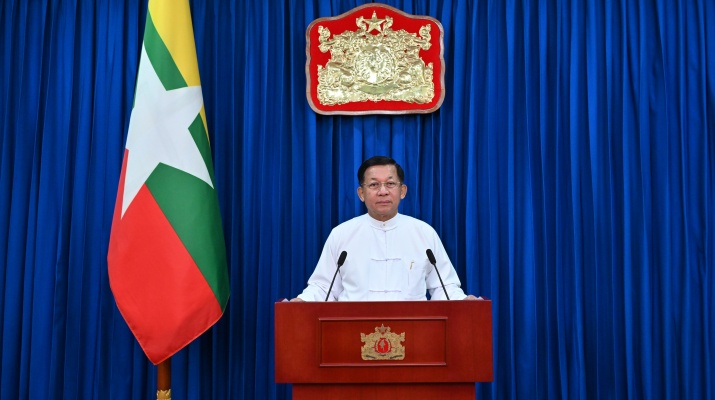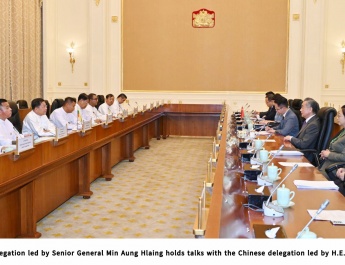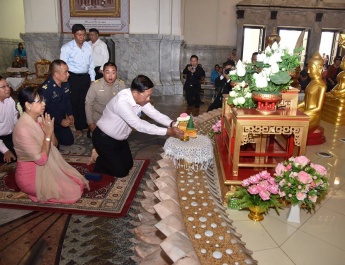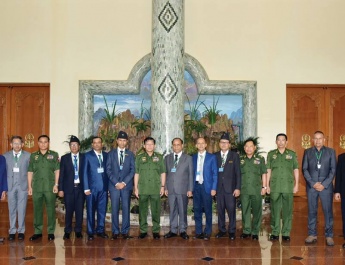(20 January 2025)
Everybody, Mingalaba!
First of all, I would like to extend my greetings and best wishes to all the distinguished guests attending today’s “53rd Myanmar Health Research Congress,” wishing you all peace of mind, good health, and prosperity in every aspect.
The Myanmar Health Re-search Congress has been held for 53 times to conduct health research of Myanmar keeping abreast of other countries.
The first congress was succe-ssfully held in 1965. During the early years of the congress, only research papers were sub-mitted. However, starting from the health research congress held in 1991, research poster exhibitions were introduced. From the 2002 congress onwards, subject-wise seminars were also incorporated, making the congresses more impactful and extensive.
Research findings based on solid and reliable results emerg-ing from health-related research congresses are instrumental in formulating modern and appropriate health policies for the nation. They also play a significant role in enhancing the effectiveness of healthcare initiatives, ensuring accessible and quality healthcare for everyone, and driving large-scale processes aimed at improving overall public health outcomes.
The theme for the 53rd Myan-mar Health Research Congress is reported to be: “Moving forward to a healthy lifestyle and addressing health risk beha-viors.” It aims to shed light on the growing significance of non-communicable diseases in the current context.
The Ministry of Health, in collaboration with relevant mi-nistries, effectively implemented measures to prevent, control, and treat diseases during the COVID-19 pandemic. Currently, with the aim of controlling the rise of non-communicable diseases, the World Health Organi-zation (WHO) is working together with the Department of Public Health, the Department of Medical Services, the De-partment of Human Resources for Health, and the Department of Medical Research under the Ministry of Health. They are conducting the “STEP Survey 2024,” a study to assess the pre-valence of non-communicable diseases in Myanmar.
Especially, it is essential for our people to maintain good basic health and live long, healthy, and resilient lives. To achieve this, it is necessary to promote the selection and consumption of nutritious and health- conscious foods, as well as to encourage health-conscious lifestyles and behaviors. This involves advancing practical health research related to these areas, widely disseminating the find-ings to the public, and providing knowledge to raise awareness.
Regarding traditional medi-cine, it is essential to collaborate with senior traditional medicine practitioners and the Depart-ment of Traditional Medicine to conduct practical research. This will ensure tangible benefits for the public, strengthen the foundation of our country’s traditional medical practices,and enable traditional medicine products to penetrate the inter-national market by generating more reliable and robust re-search-based data.
It is essential to make decisions and formulate health policies based on accurate and reliable research findings. Therefore, researchers conducting these studies must fully under-stand the significance of their findings and consistently adhere to research ethics. This aware-ness and commitment are crucial at all times.
In our country, it is essential to foster a mindset of thoroughly exploring, studying, and con-ducting research before under-taking any activities. This means encouraging the emergence of young people and intellectuals with a passion for research. We need to take action to ensure the development of individuals who are committed to research in accordance with ethical stan-dards. To achieve this, efforts should be made to establish a thriving research culture in the country, with numerous researchers emerging. This in-cludes systematically reorganizing research advisory committees and enhancing the struc-ture of research ethics boards as needed. Such measures are necessary to promote the growth and sustainability of a research-oriented culture.
The organizing committee for the congress has categorized the research papers submitted into three systematic categories: fundamental research papers, applied research papers, and papers on social and healthcare systems. The committee has reviewed and selected these sub-missions to ensure they are suitable for presentation during the congress. It has been plann-ed to present 54 research papers and display 43 posters as part of the event.
It is known that the award selection committee has re-viewed and chosen the best papers and posters from those submitted to this conference, and there are plans to present awards to recognize and honor them appropriately.
In conclusion, I would like to express my best wishes for success in these efforts to conduct research.
– When conducting health research, prioritize the public’s benefit by improving the overall health standards of the people. Focus on basic healthcare im-provement, promoting healthy living and nutrition, under-stand-ing the nature of communicable and non-communicable disea-
ses, and taking proactive measures for prevention. Increase practical research, traditional medicine studies, and interna-tional research collaborations to advance these goals.
– The research findings should also be shared with the public in a timely manner through activities such as orga-nizing congresses, publishing research journals, and releasing magazines, in order to inform and alert the public accordingly.
– Similarly, when the public attends and receives treatment at people’s hospitals, efforts should be made to ensure the provision of care that guarantees mental well-being, patient safety, and high-quality medical services. Practical research acti-vities related to medical treat-ment and hospital management should be enhanced to achieve these objectives.
– Through health research activities, may we be able to adopt health policies suitable for our country, ensure that everyone has access to high-quality healthcare, and work towards improving the level of healthcare in our country.
Thank you, all.





